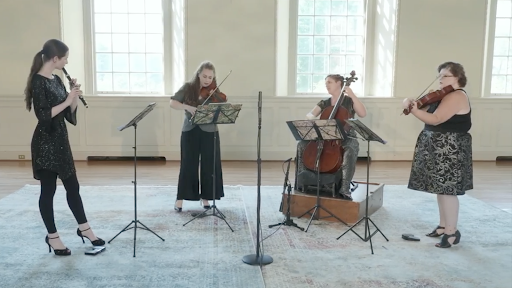by Stephanie Manning

Sunday afternoon also featured a first-time venue for the ensemble: West Shore Unitarian Universalist Church in Rocky River. Though visually unassuming, the space delivered fantastic acoustics for small instrumentations. In the Quartet for flute and strings by Joseph Bologne, Chevalier de St. Georges, the gossamer sounds of Emi Ferguson’s flute resonated perfectly above a three-piece string accompaniment. Violinist Shelby Yamin, violist Allison Monroe, and cellist Rebecca Reed contributed a great sense of energy to the piece as they supported Ferguson.
Another quartet by Bologne appeared later in the program, swapping out flute for oboe. Debra Nagy, who also arranged both works, spoke passionately about championing this quartet as part of the oboe repertoire, and it was clear why. This jubilant work, with its dance-like third movement, deserves repeated listens.
All five musicians would come together for the other two pieces, including one of the afternoon’s more traditional offerings, Luigi Boccherini’s Quintet in C. Though this work didn’t fit into the program’s theme quite as naturally as the others, there was plenty of beauty to be found in its deliberate simplicity — like the lovely flute ornamentations over the strings’ C-Major scale, and the precise unisons between the two winds.
Preceding the Boccherini was the piece that really brought the program together: Sydney Guillaume’s A Journey to Freedom. Rising from the pews to address the audience, the composer explained how he infused his commission with styles from his home country of Haiti, including traditional yanvalou rhythms. While composing, he contemplated the ideas of freedom, perseverance, and strength — not only with regard to the Haitian Revolution, but also to other revolutions both past and present.
The sound of the period instruments proved the perfect choice for the work, harkening back to the turn of the 19th century. The performance featured a beautiful blend between all players. Powerful cello rhythms drove forward the constantly repeated melody, and the ensemble eventually incorporated more contemporary techniques to mimic the sound of sirens. The thoughtful, unresolved ending leaves the listener with much to ponder about the “winds of change” in the air today.
Guillaume was in town that weekend not only to hear his own works, but also to conduct them. The October 21 and 22 performances featured different combinations of choirs from around the area, with the composer leading them in his works Ranpono, Tchaka, and This, Too, Shall Pass. Unfortunately, this element was missing from the Sunday concert, perhaps due to logistical or space constraints. Hopefully, there will be many future chances to hear more of Guillaume’s music in Northeast Ohio.
Published on ClevelandClassical.com November 1, 2022.
Click here for a printable copy of this article



